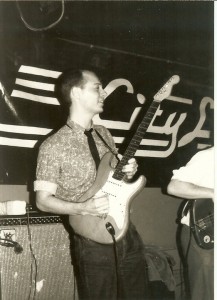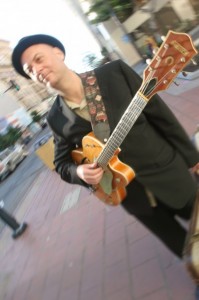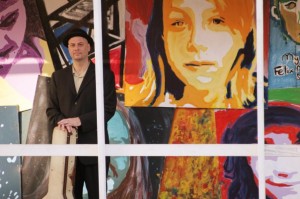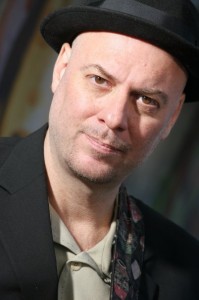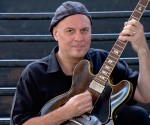
Drew Zingg is a very interesting guitarist that more people should know about, if only for his roadwork with Steely Dan. I met up with him on a beautiful day at his home in San Francisco on Friday March 7th 2014:
DP: I just want to clue people in on all the stuff that you’ve done. I’ve known about a few things like your work on Broadway shows and Steely Dan and Boz Scaggs, but beyond that I don’t know much. Why don’t we start with your background? Tell us about why you chose the guitar, where you’re from, and all of that.
DZ: Okay, Well I saw the Beatles on Ed Sullivan when I was six years old, and I had two older brothers that were way into music, and then I started getting into music at least as much as them. There was a guitar lying around the house, and so I just picked it up and continued with it. They didn’t really go with it as much as I did, but that was the influence. I grew up in Manhattan-New York City – which was a great place of course to grow up in the 60s, so I had the chance to see a lot of great music when I was very young. Because I had older brothers, the first concert I saw was when I was like seven: I saw the Lovin’ Spoonful in Central Park. And I heard (Jimi) Hendrix….let me backtrack a little bit. I heard Hendrix for the first time when I was nine years old at summer camp, and it blew my mind. So I bought his first album, you know, not really knowing anything about the guy. And then I went and saw him on his first tour of the states. It was right after he released Axis : Bold As Love, and he was playing in small little theaters. I saw him at this small little theater that was like four blocks from my house at Hunters College – just a little college theater of about 800 seats and it still there – and it was right before he exploded.
DP: Wow!!
DZ: It was in like March or February of ‘68 and later that year he was doing stadiums.
DP: The Monkees weren’t on the bill, where they?
DZ: Right, he was opening for the Monkees on his first tour in ’67, and that was technically his first tour, but this was his first tour headlining. And then I used to go to the Fillmore East a lot, and down there I saw the Allman Brothers. I didn’t know who they were when I went to see them, I was going to see Canned Heat in 1970, and Canned Heat was really big at the time because they had a couple songs in the movie Woodstock. “Going Up The Country†and a couple others-anyways, I was going to see Canned Heat and was in like the fifth row center, and this band opened up for them called the Allman Brothers. This was before “Live At The Fillmore†was recorded, and I had never heard of them. So I had a lot of great experiences like that, I saw the Dead there…I know a lot of people are kind of split about whether the Dead are…
DP: (Laughing)
DZ: …. A lot of musicians especially… I can see both sides, I was actually a “Deadhead†and I understand why a lot of musicians don’t like them…
DP (More laughing)
DZ: … so anyways, I was lucky enough to be exposed to a lot of great stuff as a kid, and I was always playing guitar. It was just the sort of thing that it was a hobby that I never gave up, and I eventually went to college. I decided to get my degree in art history, of all things, but I decided to give the music a shot. So as soon as I graduated from college, I moved back home to New York and just was playing with all sorts of singer-songwriter’s in Greenwich Village, and eventually met a lot of people down there. I was never a jazz head per se, I was more… I was into Hendrix and the Allman Brothers, and then I started to study a fair amount from books.
DP: So that’s how the sight reading sort of happened?
DZ: Well actually, I hate to break it to you, but I’m not a great sight reader…
DP: Really?
DZ: …which is one of the reasons why I did a few jingles and recording dates in New York, but that was not really my thing. That’s one reason why I got into the Broadway thing, because I was more comfortable with learning a piece of music and sticking with it for a longer period of time. And the thing with Steely Dan was when I was fortunate enough to play with them, having been a big fan I knew all their stuff… I mean, I can read charts great, but I’m not really… I mean, I wish I could, but I didn’t go to music school, and I didn’t take a lot of lessons, so I can’t really sight read super fast.
But I do a lot of stuff by ear, and my ear has really tried to compensate for my reading. But I’m not really recommending that, it’s just the way it turned out. In the late 70s when I was thinking about going to music school, there weren’t a lot of options like there are now. It was basically: you go to Berklee if you’re a be-bop head, which I am now, oddly enough…. but at the time I was kind of looking for something more, you know… in the middle, not bebop and not straight ahead rock’n’roll. And MI maybe had just been founded, so maybe if that had been around I would have gone there, but it was just before that time. So in retrospect, I really wish I had gone to music school, but I kind of taught myself….not as much as I reading as I hoped, but a lot of theory.
DP: Your reading would have to be at least pretty good to get the Broadway show gig though.
DZ: Yeah, I can read charts great, charts are no problem, it’s not like being in Zappa’s band…
DP: Or Chick Corea…(Laughs) So talk about some of the artists you worked with back then. What was the first name artist you played with?
DZ: I did some gigs with Shawn Colvin in the ‘80s…
DP: I LOVE Shawn Colvin….
DZ: Yeah, well, you know, we were all playing together in the village and I was part of that whole scene. We would do, like, weddings together…(laughs)
DP: Yeah!
DZ: … and stuff like that, you know, and I actually did some recordings with Loudon Wainwright…
DP: Yeah, of course!
DZ: … and stuff like that, I just did a lot of singer-songwriter stuff. And then actually, Tommy Wolk – you know, T-Bone Wolk, the great bass player from Hall & Oates, he was the MD (musical director) or assistant MD for Saturday Night Live through most of the 80s – I just met him on Bleecker Street and he actually got hooked up with Hall & Oates on Columbia Records, and he recommended me for a couple of tours at that point for some smaller artists on Columbia. I guess after that the thing was hooking up with (Donald) Fagen.
DP: Yeah, how did that happen?
DZ: I was working with this guy Jeff Young…
DP: “The Youngstersâ€â€¦
DZ: …… Yeah! A wonderful singer-songwriter-keyboard player, a great singer….he played with Sting, he played with Steely Dan, and was with Jackson Browne for years, and he moved to LA about 15 years ago. Anyway, we worked in New York together and we actually had a band together, Jeff Young and the Youngsters. He actually met Donald Fagan through a Broadway show he was doing called “The Gospel at Colonusâ€, which he (Donald) actually got very interested in, which was a Broadway play that lasted for a short minute, I believe that Donald produced the soundtrack on it. Donald hadn’t really done anything since Steely Dan broke up, which was about 10 years prior, so he was sort of itching to do some stuff. And his wife to be Libby was saying, you know, “You should go out there and just playâ€, so Donald started just doing some gigs. The first gig I actually saw him do was at a place called the Elaine’s, which was a duet with Dr. John with two piano players…
DP: (laughing)
DZ: And a couple of friends of mine were actually playing in the rhythm section. He was actually doing any sort of little gigs he could do, and it turned into this thing called the New York Rock and Soul Revue, which was just doing R&B covers.
DP: I think that’s where I first heard of you, was that record…
DZ: Yeah, and that just started out… he was just playing, and people were like freaking out because Steely Dan hadn’t done anything in so long, and nobody had seen them live for like 15 years. And he wasn’t even singing at all, no original tunes, And no Steely Dan. But a lot of Steely Dan heads came down and said like,†sing, Donald, singâ€, so eventually you started seeing a tune here and there, and then he started doing some covers…
DP: So, in the duet with Dr. John – Donald was just playing piano, he wasn’t singing?
DZ: That is correct, yeah. But something really cool happened that night, James Taylor was in the audience that night and sat in on a tune – which was amazing, it was great, a teeny little restaurant in the Upper East Side. Then Donald started singing more and incorporating some Steely Dan tunes, and then we did a couple big shows at the Beacon Theatre, and then Walter (Becker) got involved and we did a tour across the country. And then the next year Steely Dan did their reunion tour, and I was lucky enough to be called for that. And that was that, you know, and I did that for a few years.
DP: I have this Live -sorry to say- bootleg double CD of Steely Dan live in Italy and you’re on that. The tune that really stood out for me on your playing was â€My Old Schoolâ€, because you’re just like playing this wild intervallic stuff… (laughing).
DZ: That was fun, man, I have to say that that’s just one of the most fun gigs for a guitar player ever, because it seems like the stuff is written for guitar – there’s a big hole there it’s just waiting to be filled. And actually they gave me a lot of leeway-I remember that some of the advice Donald gave me was â€hey, when you’re doing these tunes, just do me a favor and don’t play the solo on the recordâ€. Which was great, so… I mean, it was cool to hear, but I had to give a nod here and there, because I knew all the solos very well, as part of my DNA almost. But there was a lot of freedom, and it was really a fun thing and they were very open about that.
DP: So, now you’re playing with Boz (Scaggs), right? How did you get that gig?
DZ: Well, Boz did the Rock and Soul Revue and that’s how I met him. And Michael McDonald did that as well, who I’ve played with from time to time, and basically that’s how I met them.
DP: So, obviously, Hendrix was a big “starter influence†for you, But who else have been the big guys that you’ve really listened to?
DZ: Well, like I said, Duane Allman and Dickie Betts when I was younger especially…
DP: And so Derek Trucks is somebody you like now?
DZ: I do! I mean, he’s phenomenal! And Warren Haynes… and then there’s a guy, Buzz Feiten…
DP: Oh yeah, I just saw him at the NAMM show and he’s interested in doing a master class for JGS…
DZ: Oh great…
DP: You know he’s got a new guitar manufacturing company…
DZ: Yeah, the Buzz Feiten guitar… so, he was a big influence on me. He did an album called “Full Moon†around 1972….
DP: Yup! “To Knowâ€, remember that tune?
DZ: Yeah, yeah, and the stuff he did with the Butterfield blues band. He was kind of like pre-Robben Ford, you know, kind of like doing what Robben does as well. And you know, Robben is a big influence, and Scofield, you know, the usual…(Laughing).
DP: I hear all that! Scofield and Robben I definitely hear in you.
DZ: A lot of people thought I was copying Larry Carlton…you know, I respect him a lot, but I was more coming from the Robben thing, which I think we both have in common. And I happened to pick up on this 335 because I was way into this Buzz Feiten thing during the period in this early 70s when he was playing a 345 actually. And nobody in New York was playing those, in the 80s…
DP: Yeah, it was all Fenders at the time…
DZ: … it was all the Floyd Rose locking tuners and locking tremolos, you know, and I would actually go to gigs with my 335…. I remember going to a jingle once, and the producer came out and looked at the guitar and said, “We can’t have that, what are you doing with that?â€, and basically, they asked me to leave because of the guitar! (Both laughing) And so nobody was playing them (Gibson ES-335s), and that’s actually why there was this Larry (Carlton) connection. And they came back of course, but I found one in the late 80s that I really had a connection with, so I’ve always liked that, especially with the Scofield thing and the Buzzy Feiten.
DP: So, how long have you lived here in San Francisco?
DZ: About five years.
DP: And so what are some of the things you have planned for yourself, other than Boz Scaggs? I know you just put out a solo CD….
DZ: Right, I was lucky enough to get a wonderful band together for this album…
DP: What’s it called again?
DZ: It’s called “Drew Zingg†(laughs)
DP: Innovative title! (laughs)
DZ: … and Vinnie Colaiuta, Will Lee and George Whitty on keys is basically the band, and of course they’re all fabulous. But I’ve been on the road so much with Boz that it’s been hard to focus at home on anything else, but I’m hoping to do that, well, actually, TOMORROW (laughs). I’m doing a couple other little gigs, I’m playing with the big band here in San Francisco with this wonderful drummer named Tommy Igo, and we played Yoshi’s, and they’re wonderful charts… so between time Tommy and doing my own thing, that sort of next in my docket.
DP: Do you teach much here?
DZ: I’m going to start doing that, yeah. I teach a little bit, but I’m going to be doing that more. But like I told you before, teaching for me is kind of an idiosyncratic thing, because I am basically self-taught. I wasn’t handed down a method from a teacher, so the way I teach is very idiosyncratic and I don’t have one method that I teach, it’s just sort of like,†this is how I learned, and if you want to you want to pick up on it that’s cool; if you don’t, then that’s cool too!†(Laughs)
For more on Drew Zingg, go to: http://www.dzdap.com/
